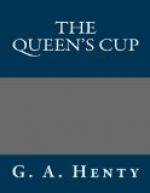Not a day was lost at Calcutta. General Sir Colin Campbell, who was now in supreme command, was collecting a force at Cawnpore. There he had already been joined by a column which had been despatched from Delhi as soon as the capital fell, and by a strong naval brigade with heavy guns from the ships of war.
All arrangements had been made for pushing up reinforcements as fast as they arrived, and the troops were marched from the side of the ship to a spot where a flotilla of boats was in readiness. The men only took what they could carry; all other baggage was to be sent after them by water, and to lie, until further instructions, at Allahabad. As soon, therefore, as the troops had been packed away in the boats, they were taken in tow by two steamers, and at once taken up the river. Officers and men were alike in the highest spirits at finding themselves in so short a time after their arrival already on the way to the front, and their excitement was added to by the fact that it was still doubtful whether they would arrive in time to join the column. Cramped as the men were in the crowded boats, there was no murmuring as day after day, and night after night, they continued their course up the river.
At Patna they learned that the Commander in Chief was still at Cawnpore, and the same welcome news was obtained at Allahabad; but at the latter place they learned that the news of his having gone forward was hourly expected.
They reached Cawnpore on the morning of the 11th, and learned that the column had left on the 9th, but was halting at Buntara. Not a moment was lost. Each man received six days’ provisions from the commissariat stores, and two hours after landing the regiment was on the march and arrived late at night at Buntara, being received with hearty cheers by the troops assembled there.
They learned that they were to go forward on the following morning. Weary, but in high spirits at finding that they had arrived in time, the regiment lighted its fires and bivouacked.
“This has been a close shave indeed, Mallett,” one of the other captains said, as a party of them sat round a fire. “We won by a short head.”
“Short indeed, Ackers. It has been a race all the way from England, and it is marvellous indeed that we should arrive just in time to take part in the relief of Lucknow. A day later and we should have missed it.”
“We should not have done that, Mallett, for the men would have marched all night, and, if necessary, all day tomorrow, to catch up. Still, it is a wonderful fluke that after all we should be in time.”
“There is no doubt that it will be a tough business,” one of the majors said. “Havelock found it so, and I expect that the lesson he taught them hasn’t been lost, and that we shall have to meet greater difficulties than even he had.”
“Yes, but look at our force. Sixteen guns of Horse Artillery, a heavy field battery, and the Naval Brigade with eight guns; the 9th Lancers, the Punjaub Cavalry, and Hodson’s Horse; four British regiments of infantry and two of Punjaubies, besides a column 1,500 strong which is expected to join us tomorrow or next day.




